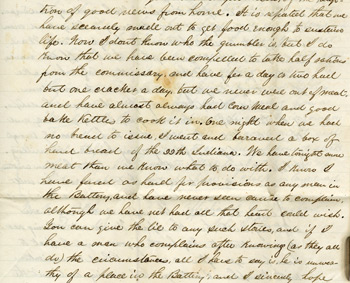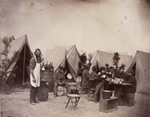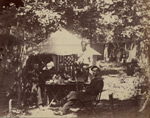Click Center Image for Full Size Picture
Every soldier knows food is important to an army. Rations, the amount of food authorized for one soldier per day, keep an army moving. The quality of food, as well as the quantity, affects morale.
During the Civil War, the Union Army had two types of rations: "marching rations" and "camp rations." Marching rations consisted of sixteen ounces of hard bread, also known as "hardtack"; twelve ounces of salt pork or twenty ounces of fresh meat; and sugar, coffee, and salt. Two or three crackers of hardtack, about three inches square each, fulfilled the daily ration for hard bread. Camp rations could substitute soft bread, flour, or cornmeal for hardtack, and included extras such as dried beans or peas, rice, vinegar, and molasses, along with an allotment of soap and candles. The ration was designed to fill a soldier's stomach, not to provide energy to march or fight.
At the beginning of the war, soldiers had to cook their rations themselves. This took time, and the quality of meals depended on the cooking skills of the individual. Enlisted men would often cook with their friends, sharing the work and the food. Eventual reforms included the designation of company cooks resulting in better food and higher morale. Officers like Cheney did not draw rations when in camp; they received an allowance to purchase supplies from the Brigade Commissary and could hire a civilian to cook their meals.
Davis Mill, Mississippi.
To add some variety, soldiers requested favorite foods from home. They also received gifts of food from aid societies and could purchase food from sutlers in camp, although the prices were often higher than they were used to at home.
When on the march, the army's supply lines stretched out and were vulnerable to attack. Soldiers could be sent to forage for food and other supplies from Confederate citizens. Cheney sent his men to forage, sometimes looking the other way whenever it was not authorized by higher headquarters.
In a letter to Mary on January 11, 1863, Cheney reassured her that he was well fed. Apparently, she had read that the men in Tennessee had scarcely enough food. After describing his diet, Cheney stated, "While there is corn in Egypt, or food in the Southern Confederacy, no man in Cheney's Battery shall go hungry, orders or no orders."



